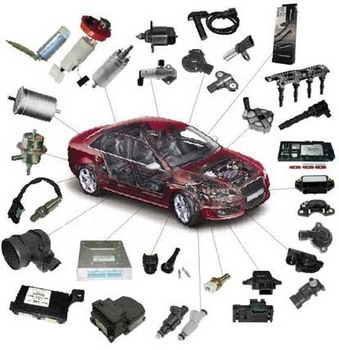Michigan Delegation Is Pressing Support for Michigan’s Auto Parts Suppliers
 |
From Martha Hindes
Senior Editor
Michigan Bureau
The Auto Channel
At a time political differences couldn't be much more at war with each other, the auto supply industry has managed to get a handshake across the aisle.
Three Michigan politicians from both parties have come to the aid of the auto supply industry with a joint appeal to the Trump administration for emergency funding to support the companies that form a backbone for the entire auto industry. Two, Senator Gary Peters and first-term Representative Haley Stevens, are Democrats. Representative Fred Upton is a longstanding Republican (also known in fashion and sports circles as the father of supermodel Kate Upton, wife of baseball pitching ace Justin Verlander).
Michigan, the acknowledged home of the American auto industry, has more than 125,000 auto supply workers.
Official Press Release
WASHINGTON, DC May 12, 2020 – U.S. Senator Gary Peters (MI)</a> and U.S. Representatives Fred Upton (MI-06) and Haley Stevens (MI-11) today led members of the Michigan Congressional delegation in a letter to the Trump Administration requesting an immediate dialogue to support the auto supply parts industry in Michigan and across the country amid the Coronavirus pandemic. In the letter, the lawmakers highlight how auto suppliers employ over 125,000 Michiganders and have complex supply chain needs that require immediate attention. The members additionally requested that the Administration use its authority under the CARES Act to provide financial assistance to the auto supplier industry.
“Michigan is the heart of the global auto industry – but that heart cannot beat without our state’s auto suppliers being strong and vibrant as well,” said Senator Peters. “Ensuring that auto suppliers have the financial standing to start back up again is necessary towards reopening our auto manufacturers – and Michigan’s economy. I look forward to working with my colleagues and the Trump Administration on a safe path forward that can strengthen Michigan’s economy and support the auto industry.”
“Every sector of the economy is feeling the harsh impacts of the coronavirus crisis, and our auto suppliers are no different,” Upton said. “These suppliers dot southwest Michigan and are the backbone of our local economies, employing 125,000 Michiganders. But this pandemic has hit them hard and they need relief. Congress and the Administration need to work together on solutions to protect jobs and help spur an economic recovery.”
“Michigan’s 11th District is home to the most robust automotive supply chain in the country, and these critical businesses play a major role in our regional economy by employing over 125,000 Michigan workers,” said Congresswoman Stevens. “These businesses have struggled during the pandemic with the auto manufacturers at a stand-still for weeks. We must ensure that our supplier network is receiving the support they need during this crisis so our automotive industry can recover quickly.”
The letter – which was delivered to Treasury Secretary Steve Mnuchin – was also signed by U.S. Senator Debbie Stabenow (MI) and U.S. Representatives Bill Huizenga (MI-02), Tim Walberg (MI-07), Dan Kildee (MI-05), Debbie Dingell (MI-12), John Moolenaar (MI-04), Brenda Lawrence (MI-14), Paul Mitchell (MI-10), Elissa Slotkin (MI-08), Rashida Tlaib (MI-13) and Andy Levin (MI-09). The letter is supported by the Motor & Equipment Manufacturers Association (MEMA).
Complete Letter To Secretary Steven Terner Mnuchin
Dear Secretary Mnuchin;
Motor vehicle parts manufacturers are the linchpin of U.S. vehicle manufacturing. No sector has more complex supply chains or provides more direct manufacturing jobs than motor vehicle parts manufacturing. This industry employs over 871,000 people across the United States with over 125,000 jobs in Michigan alone. We write to you today to open an immediate dialogue on providing critical financial assistance to this industry during this time of national crisis. This can be accomplished under existing CARES Act authority.
Although we write to you as the Michigan delegation, the impact of supplier employment and the need for liquidity will be felt across the country. While there are many large suppliers with operations in the U.S., two-thirds of this industry’s employment is generated by small and mid-sized manufacturers. These entities are often U.S.-based with limited financial resources to meet the growing needs of this crisis. Without these suppliers, communities and states throughout the country will lose major employers, which are contributors to the long-term employment and economic well-being of the entire nation.
Parts suppliers usually receive payment from auto manufacturers 45 days after the delivery of goods. As you know, vehicle production has been at a stand-still since late March. With vehicle manufacturers scheduled to ramp up production as soon as May 18th, most suppliers will have had no receivables for at least 6 weeks and thus no access to working capital for start-up costs. Since component and parts manufacturers provide two-thirds of the value of every vehicle, auto manufacturing needs a healthy and functioning supply base in order to efficiently restart automotive manufacturing.
Although current programs under CARES have provided critical assistance for the retention of employees, additional funds must be targeted to the purchase of raw materials and other critical costs. The creation of a special purpose vehicle for suppliers would allow the government to stretch currently appropriated funding further—either through the factoring of receivables or a broader loan program. We believe that more flexible terms could be coupled with loans of shorter duration to focus on immediate liquidity needs rather than longer-term investment.
Ultimately, our shared economic future depends on the industry’s collective ability to ramp up vehicle and parts production. We look forward to scheduling an immediate dialogue on this crisis.


